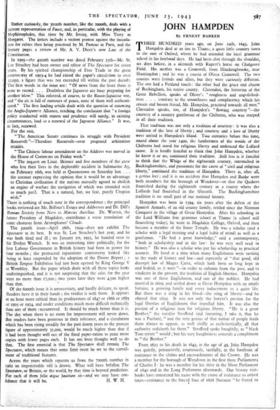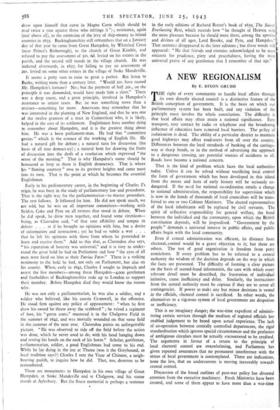JOHN HAMPDEN
By ERNEST BARKER
That tradition was not only a tradition of courtesy : it was also a tradition of the love of liberty ; and courtesy and a lave of liberty were united in Hampden's blood. Two centuries before this time, round about the year taw, the lumbermen of 'the woods of the Chilterns had stood for religious liberty and embraced 'the Lollard cause. It is hardly fanciful AO think that John Hampden, whether he knew it or no, continued their tradition. _Still less is it fanciful to think that the Whigs .of she eighteenth century, entrenched in Buckinghamshire, and passionate for the cause of " civil and religious liberty," continued the :tradition of Hampden. There is, after alt, a genius loci ; and it is no accident that Hampden and Burke were both .members for .the borough of Wendover—or that the Quakers flourished during the eighteenth century in a county where the Lollards had flourished in the fifteenth. The Buckinghamshire tradition is no small part of our national history.
Hampden was born in 2594, six years after the defeat of the Spanish Armada, of an old county family, settled since the Norman Conquest in the village of Great Hampden. After his schooling in the Lord Williams free grammar school at Theme (a school still flourishing today), he went to Magdalen College, Oxford, and then became a member of the Inner Temple. He was a scholar (and a scholar with a legal training and a legal habit of mind) as well as a gentleman. "He had a great knowledge," said a contemporary, " both in scholarship and in the law : he was very well read in history." He was also a scholar who put his scholarship to practical account. He lived at a time when many Englishmen were turning to the study of history and law—and especially of " that good, old decrepit law of Magna Carta, which hath been so long kept in and bedrid, as it were "—in order to exhume from the past, and to . vindicate in the present, the tradition of English liberties. Hampden was one of these Englishmen, and one of the noblest. He had married in 1619, and settled down at Great Hampden with an ample fortune, a growing family and every inducement to a quiet life. But there was a sting in his blood—the sting of liberty—and he obeyed that sting. It was not only the lawyer's passion for the legal liberties of Englishmen that impelled him. It was also the passion of a religious man for religious liberty. "He is a great Brother," the royalist Strafford said (meaning, I take it, that he was a Puritan), " and the very genius of that nation of people leads them always to oppose, as well civilly as ecclesiastically, all that authority ordaineth for them." Strafford spoke haughtily, as " black Tom tyrant" would ; but his very haughtiness conceals a compliment to " the Brother."
From 1625 to his death in 1643, at the age of 49, John Hampden was quietly, persuasively, courteously, tactfully, in the forefront of resistance to the claims and encroachments of the Crown. He was a member for the borough of Wendover in the first three Parliaments of Charles I : he was a member for his shire in the Short Parliament of 164o and in the Long Parliament afterwards. Our history text- books have connected his name with the cause of resistance to unjust taxes—resistance to the forced loan of r6z6 (because " he feared to • draw upon himself that curse in Magna Carta which should be read twice a year against those who infringe it ") ; resistance, again (and above all), to the extension of the levy of ship-money to inland counties in 1635. Buckinghamshire still remembers that on a January day of that year he came from Great Hampden, by Whiteleaf Cross (near Prince's Risborough), to the church of Great Kimble, and refused to pay the assessment of 31s. 6d. levied on his estates in the parish, and the record still stands in the village church. He was indicted afterwards, in 1637, for failing to pay an assessment of 2os. levied on some other estates in the village of Stoke Mandeville.
It seems a petty sum to raise so great a pother. But listen to Burke, writing more than a century later. " Would 2os. have ruined Mr. Hampden's fortune? No ; but the payment of half 20S., on the principle it was demanded, would have made him a slave." There was a deep cause, and a great principle, involved in Hampden's resistance to unjust taxes. But he was something more than a resister—something far more. Americans may remember that he was interested in the planting of New England, and that he was one of the twelve grantees of a tract in Connecticut who, it is likely, helped in the cost of its settlement. Englishmen have another thing to remember about Hampden, and it is the greatest thing about him. He was a born parliament-man. He had that " committee genius " which is the essence of the working of English life. He had a natural gift for debate ; a natural turn for discussion (the basis of all true democracy) ; a natural bent for drawing the fruits of discussion into the draft of a resolution which expressed " the sense of the meeting:" That is why Hampden's name should be honoured as long as there is English democracy. That is where his " flowing courtesy " rose to its greatest heights and came most into its own. That is the point at which he becomes the essential Englishman.
Early in his parliamentary career, in the beginning of Charles I's reign, he was busy in the study of parliamentary law and precedents. That is the right way for the parliamentarian—to master procedure. The rest follows. It followed for him. He did not speak much, we are told, but he was on all important committees—working with Selden, Coke and Pym on all matters that stood in debate. When he did speak, he drew men together, and found some cirenicon- being, as Clarendon said, " of that rare affability and temper in debate . . . as if he brought no opinions with him, but a desire of information and instruction ; yet he had so subtle a way . . . that he left his opinions with those from whom he pretended to learn and receive them." Add to this that, as Clarendon also says, " his reputation of honesty was universal," and it is easy to under- stand the great hold he had on Parliament and how " the eyes of all men were fixed on him as their Patriae Pater." There is a striking testimony to the hold he had, not only on Parliament, but also on his county. When, early in 1642, Charles I sought to impeach and arrest the five members—among them Harnpden-4,000 gentlemen and freeholders of Buckinghamshire rode up to London to support their member. Before Hampden died they would know the reason why.
He was not only a parliamentarian, he was also a soldier, and a soldier who believed, like his cousin Cromwell, in the offensive. He stood firm against any policy of appeasement : " when he first drew his sword he threw away the scabbard " ; he raised a regiment of foot, his " green coats," mustered it in the Chalgrove Field in the summer of 1642, and was mortally wounded on that same field in the_siimmer of the next year. Clarendon paints an unforgettable picture. " He was observed to ride off the field before the action was done, which he never used to do, with his head hanging down and resting his hands on the neck of his horse." Scholar, gentleman, parliamentarian, soldier, a good Englishman had come to his end. While he lay dying in the inn at Thame (was it the Greyhound, as local tradition says?) Charles I sent the Vicar of Chinnor, a neigh- bouring parish, to inquire how he did. That, too, deserves to be remembered.
There are monuments to Hampden in his own village of Great Hampden, at Stoke Mandeville and at Chalgrove, and his statue stands at Aylesbury. But the finest memorial is perhaps a sentence •
in the early editions of Richard Baxter's book of i65o, The Saints' Everlasting Rest, which records how " he thought of Heaven with the more pleasure because he should meet there, among the apostles and divines of all ages, Lord Brooke, and Pym, and Hampden." That sentence disappeared in the later editions ; but these words still appeared : " He that friends and enemies acknowledged to be most eminent for prudence, piety and peacefulness, having the most universal praise of any gentleman that I remember of that age."































 Previous page
Previous page